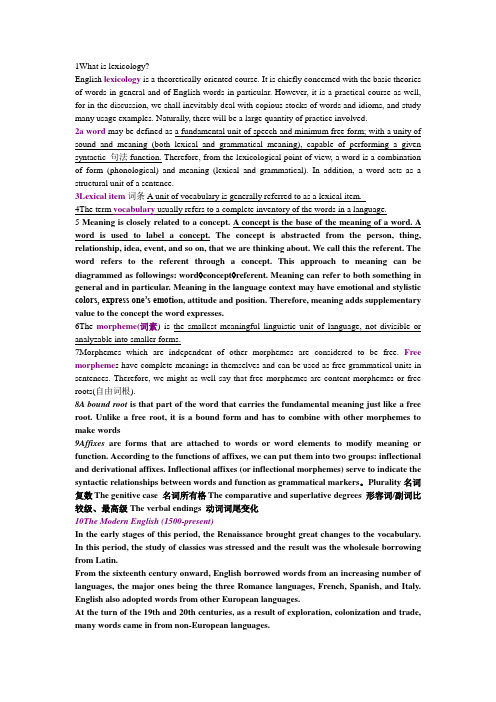英语专业词汇学课件1.What is Lexicology
- 格式:ppt
- 大小:104.00 KB
- 文档页数:19


1What is lexicology?English lexicology is a theoretically-oriented course. It is chiefly concerned with the basic theories of words in general and of English words in particular. However, it is a practical course as well, for in the discussion, we shall inevitably deal with copious stocks of words and idioms, and study many usage examples. Naturally, there will be a large quantity of practice involved.2a word may be defined as a fundamental unit of speech and minimum free form; with a unity of sound and meaning (both lexical and grammatical meaning), capable of performing a given syntactic 句法function. Therefore, from the lexicological point of view, a word is a combination of form (phonological) and meaning (lexical and grammatical). In addition, a word ac ts as a structural unit of a sentence.3Lexical item词条A unit of vocabulary is generally referred to as a lexical item.4The term vocabulary usually refers to a complete inventory of the words in a language.5 Meaning is closely related to a concept. A concept is the base of the meaning of a word. A word is used to label a concept. The concept is abstracted from the person, thing, relationship, idea, event, and so on, that we are thinking about. We call this the referent. The word refers to the referent through a concept. This approach to meaning can be diagrammed as followings: word◊concept◊referent. Meaning can refer to both something in general and in particular. Meaning in the language context may have emotional and stylistic colors, express one’s emoti on, attitude and position. Therefore, meaning adds supplementary value to the concept the word expresses.6The morpheme(词素) is the smallest meaningful linguistic unit of language, not divisible or analyzable into smaller forms.7Morphemes which are independent of other morphemes are considered to be free. Free morpheme s have complete meanings in themselves and can be used as free grammatical units in sentences. Therefore, we might as well say that free morphemes are content morphemes or free roots(自由词根).8A bound root is that part of the word that carries the fundamental meaning just like a free root. Unlike a free root, it is a bound form and has to combine with other morphemes to make words9Affixes are forms that are attached to words or word elements to modify meaning or function. According to the functions of affixes, we can put them into two groups: inflectional and derivational affixes. Inflectional affixes (or inflectional morphemes) serve to indicate the syntactic relationships between words and function as grammatical markers。



